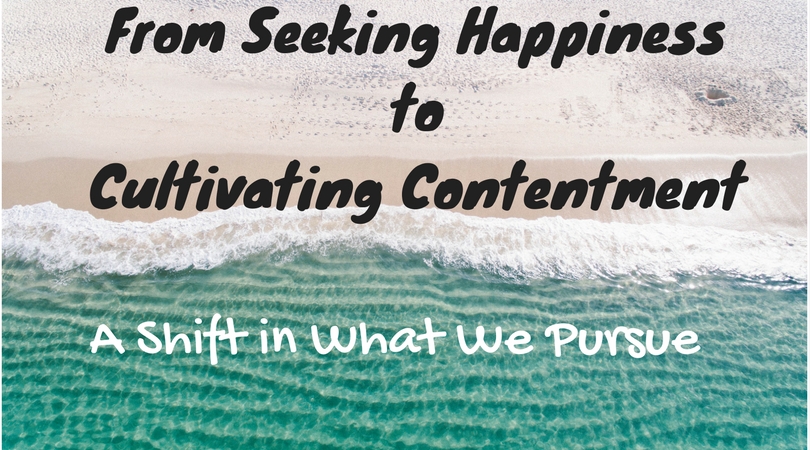162: From Seeking Happiness to Cultivating Contentment: A Shift in Pursuit
The Simple Sophisticate - Intelligent Living Paired with Signature Style - Un podcast de Shannon Ables - Les mercredis

Catégories:
~The Simple Sophisticate, episode #162
~Subscribe to The Simple Sophisticate: iTunes | Stitcher | iHeartRadio
"Focusing on happiness as our ultimate goal is self-defeating; being in a constant state of happiness is, simply put, impossible."—Paul Hudson
Place the word happiness on the cover of a self-help book and it will sell more times than it won't (Amazon has over 40,000 book titles with the word). The concept of happiness has a mass following as once we've experienced the feeling of our happy neurochemicals surging through our mind and being, we want more. And who wouldn't? However, as Paul Hudson reminds, "Happiness is not a natural state; it's an elevated state." Since happiness is not a natural state that we are born at (however, we can attain it, just as we can attain sadness, but we are not born sad), the question to determine is at what state are we born? A couple of years ago I shared Dr. E.P. Seligman's equation of what happiness consists of. Set range based on your biological parents Circumstances of your life (money, relationships, health, religion) Voluntary factors under your control (how you deal with the past, think about the future, etc) The Equation: H (happiness) = S + C + V Based on the realization that we individually have a set range as the foundation (accounting for 1/3 of our happiness potential), it is the other circumstances and voluntary actions that can heighten or depress the level of happiness we may attain. You may be looking at this equation and thinking, "Well, I absolutely can be happy all the time if two of the primary components are in my control." Are they though? Entirely, your circumstances and the voluntary factors are not in your control; however, how you respond to them, how you manage them, how you navigate the events, people and setbacks is in your control. Therefore it is how you navigate, it is the place from which you approach your circumstances, change them as you can and how you change them, that will either heighten the chances of moments of happiness or decrease. When we look closely at the term happiness, the root "hap", it is of Old English origin that came to be used in the 12th century. Its definition was "one's luck or lot" and "an occurrence, happening, or accident". I understand that words evolve, change and shift according, quite simply, to their use and context. After all, when Thomas Jefferson and his crew in the late 18th century added "the pursuit of happiness" as an inalienable right for all Americans, the word's meaning shifted significantly. It became about seeking pleasure and avoiding pain. It became about me, not others, society, and community. Gone was the understanding that "Aristotle believed that happiness was the by-product of a life of virtue".
“Many persons have a wrong idea of what constitutes true happiness. It is not attained through self-gratification but through fidelity to a worthy purpose.”
It is important to point out that simply having the time and ability to think about what makes one happy and then cultivate a life more attractive to moments of happiness is a sign of significant prosperity. And since you are reading this post, that in and of itself is something to celebrate, but now the important part is to shift how you go about experiencing happiness.
“There’s a certain tendency in our culture to want to graft some kind of happiness onto an existing structure,” Hanson said. “If you just fill in the blank — get this car, find the right shade of lipstick, go on vacation in Mexico, lose those five pounds — suddenly you’ll be happier and have the fulfillment you want in life ... Let’s be clear: The main happiness industry in America is the advertising industry.” —cognitive psychologist Rick Hanson, author of Hardwiring Happiness,
Do not fall into the trap psychologist Rick Hanson points out above. Do not let the outside world, the marketing world tell you what it takes to attain happiness. Rather take a look at the list below and discover how to make the shift in our daily lives from seeking happiness to cultivating a life of contentment: 1.Shift your perspective on challenging situations 2. Understand that fear of the unknown is a good sign 3. Not being happy doesn't mean you are sad The expectation of constant happiness gets in the way of learning how to feel and exist with these other emotions that are not all the opposite of happy. We can be curious, interested, ambivalent, neutral, focused, challenged, and I am just barely scratching the surface. Take a look here at a lengthy list of different emotions. What our job needs to be is properly identifying what we are feeling, and while sometimes we may be able to explain why, we don't actually have to know the root all of the time. Simply knowing what we are feeling and letting ourselves feel that particular emotions is a very healthy skill which leads me to . . . 4. Build a life of wholeness
"We’re kind of teaching our kids that happiness is the default position — it’s rubbish. Wholeness is what we ought to be striving for and part of that is sadness, disappointment, frustration, failure; all of those things which make us who we are. Happiness and victory and fulfillment are nice little things that also happen to us, but they don’t teach us much ... I’d like just for a year to have a moratorium on the word “happiness” and to replace it with the word “wholeness.” Ask yourself “Is this contributing to my wholeness?” and if you’re having a bad day, it is." —Australian social researcher Hugh Mackay
A life of wholeness, as pointed out above will involve from time to time sadness. To feel sadness is to have known love, joy, tranquility and yes, happiness. It is how you navigate through these daily occurrences. And when you know how to navigate, much like driving a car or navigating the subway or airline travel, you empower yourself to arrive successfully at your destination. 5. Choose to handle negative situations in a productive way Which builds your resilience and persistence, thus building your opportunity to experience happiness when opportunities come along that require you to be resilient and persistent in attaining them. 6. Practice patience: Let go of the need for fast fixes 7. Practice mindfulness Being mindful asks us to be present which requires us to have the ability to be the captain of our mind. 8. Improve self-awareness
Our natural state needs to be content rather than happy. Once we realize and practice building and living a life of contentment, we broaden the opportunity for happiness to be experienced. I have written extensively about contentment here on the blog (have a look at the posts below)
~15 Everyday Habits to Live a Life of Contentment
~11 Life Truths About Contentment That Seem Impossible Until We Experience Them
~10 Things People Who Have Found Contentment Understand About Uncertainty
~One Small Adjustment Away from Contentment
"Happiness is essentially an end result of some action we’ve taken," marriage counselors Ben and Janelle Novell
So much of our discontent is a misunderstanding of what constitutes happiness. Once we put it into its rightful place, which is a glorious experience to behold, we can appreciate it all the more as well as not be so disheartened when it doesn't last indefinitely. The good news is, it will return so long as we cultivate a life of contentment. And that is something we can do each and everyday.
Petit Plaisir:
~Gruyère Tomato Tart, click here for the recipe
 ~View more episodes from The Simple Sophisticate here. ~Listen to the most downloaded episode in a single day (#161 - Ask Shannon) here.
~View more episodes from The Simple Sophisticate here. ~Listen to the most downloaded episode in a single day (#161 - Ask Shannon) here.

